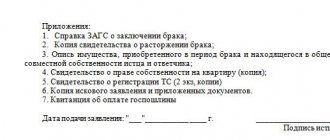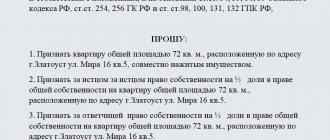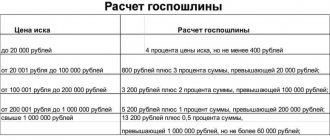Love between a man and a woman, which naturally leads to marriage, does not at all imply complete neglect of the material side of family life. As well as the loss of financial independence by spouses from each other.
Owning personal property in marriage (as well as dividing income or repaying debts to each other) is not prohibited, but, on the contrary, is encouraged.
Therefore, marital division of property is not necessarily a quarrel and divorce. The law provides for various ways of dividing common property. It is quite acceptable to divide material values among each other and continue a harmonious life together.
Is it possible to divide property without divorce?
According to Article No. 38 of the Family Code of the Russian Federation, this can be done at any time and in any circumstances: before a divorce, during a divorce, after a divorce, or even without considering the option of divorce.
The property rights of spouses are regulated by Articles 7 to 9 of the RF IC. If we simplify the information contained in them as much as possible, we get the following. Husband and wife have equal rights to all property and material assets acquired during marriage. Savings, real estate, means of transport, valuables belong to the spouses in a ratio of 50%/50%.
Sample statement of claim for division of marital property
Due to the huge variety of reasons that can serve as the basis for the division of property of spouses in marriage, it is impossible to develop any universal sample of a claim.
The option proposed below is the division of property in marriage due to the presence of a personal debt of the spouse, the settlement of which may affect the property rights of the other spouse.
Page 1
Page 2
What is shared?
Joint property is subject to division. That is, everything acquired during marriage. The legal term is “community property.” This concept includes:
- Any income of the husband and wife: salaries, pensions, scholarships, social benefits (with the exception of “children’s”), business profit.
- Savings made on their basis: deposits, shares in authorized capital, shares and other securities
- Real estate and movable property
- The general principle of division is the same as in the case of divorce - everything in half.
ATTENTION! Family property is considered common, regardless of whose specific income it was acquired with. Simply put, no matter who earns how much, it is believed that the resource invested by husband and wife in the well-being of the family is equal. This principle allows for fairness towards women who perform the traditional female family role. She takes care of the house, raises children and provides the man with all the conditions for a successful, effective career. The fact that the wife in this case does not “bring money into the house” is considered normal - she already has enough work. However, if the husband does not work, does not manage the house, does not take care of the children, but at the same time spends the family budget exclusively on his own needs, the court may review his right to half of the family property during division.
What is not shared?
Joint property in a family does not mean that spouses do not have personal property. This includes:
- Property for personal use (clothing and shoes, tools and supplies used for work or hobbies)
- Property or funds owned personally by a man/woman before they were married
- Property acquired during marriage, but with premarital savings of a woman or man
- Property given personally to a husband or wife. This also applies to their gifts to each other.
- Property inherited by husband or wife
Personal property cannot be divided.
ATTENTION! Some personal property may become marital property over time. For example, before marriage, a husband or wife owned a dilapidated house. Over the next years, the family worked together, turning the “trash” into a “mansion.” As a result, property values have increased significantly. Such property is already considered common. In other words, personal property becomes common, the value of which has increased significantly due to jointly invested funds, time, and labor.
Methods of division without divorce
Article No. 38 of the RF IC, already mentioned above, regulates two ways of dividing joint property:
- Through the conclusion of an agreement. If the family does not have expensive property, an oral agreement is sufficient. If its total value is more than 10 thousand rubles, it will be necessary to draw up a written document that will determine the procedure for disposing of, owning, and using the common property. There are two forms of such documents: “Agreement on division of property” and “Marriage agreement”.
- Through the court. If you can’t reach an agreement, you have to go to court. In practice, judicial division of property means that divorce is not far off. But it is not necessary to combine them into one process. Property can be divided through a separate process.
Division of joint property by agreement
Above we talked about two documentary forms in which it can be recorded. Now let's look at each of them in a little more detail. You can decide for yourself which is preferable in your specific situation, depending on the needs of your family.
Agreement on the division of joint property in marriage
The agreement can be drawn up in any form. This can be a simple list of objects of joint ownership with a description, an indication of the cost, and the shares in which it belongs to one or another spouse. Or the procedure for using (for example, a dacha or a vehicle), containing a list of the responsibilities of the husband and wife regarding their maintenance, care, and repairs. It is possible to draw up several separate agreements for each property.
It is not necessary to notarize the Agreement. Signed by both spouses, it acquires the force of a document that, if necessary, will be accepted by the court for consideration. But you can optionally have it certified by a notary.
There is only one limitation. The agreement must not clearly violate the rights of the husband or wife. Roughly speaking, if one of the spouses insists on sole ownership and use of some object of family property, the second spouse must receive an object of comparable material value for sole use.
Marriage contract
Currently, many young couples enter into a prenuptial agreement while preparing for the wedding. Some consider this step unromantic, but it speaks of people's conscious attitude towards marriage.
A competently and thoughtfully drawn up marriage contract simplifies the property relations of people in a marriage. And when it comes to divorce and division of property, it helps spouses avoid hassle and maintain good relationships - after all, there will be much less reason for momentary quarrels and disputes.
The main difference between the Agreement and the Marriage Contract is that it regulates not only current, but also future property relations. That is, it concerns not only the common property of the spouses at the moment, but also the property that will be acquired throughout the marriage. And:
- Provides the conditions under which the Marriage Agreement comes into force, is valid or is canceled.
- Must be in written form and require formal wording
- Must be notarized
A prenuptial agreement can be drawn up before marriage or at any time while already married. In case of divorce, the Marriage Agreement ceases to be valid immediately after the dissolution of the marriage.
If there is a marriage contract
The presence of a marriage contract eliminates the need for spouses to involve a judicial authority for the division of marital property in 2021. This document, unlike a settlement agreement, allows you to change the size and form of ownership of the other spouse’s personal property. Those. if the apartment was purchased before the wedding, and the husband wants his wife to have a share in it, then this point can be determined in the contract.
It is permissible to determine the owners of things that the spouses have not yet acquired, but are only planning. This document can be declared invalid only in two cases:
- It conflicts with the legislation of the Russian Federation.
- Its terms put one of the parties in a deliberately disadvantageous financial position.
Like an agreement, a marriage contract must be notarized, otherwise it will not have legal force.
The legal process of dividing joint property in marriage
When it is not possible to agree on an amicable division of joint property, one of the spouses may file a lawsuit. The second spouse can agree with the plaintiff’s arguments or protest them by filing a counterclaim. Property can be divided regardless of whether divorce proceedings have begun or not.
When dividing property acquired during marriage, the court is guided by Articles No. 34-39 of the RF IC. In accordance with the provisions of these articles, the court examines:
- Family relationships
- General financial situation of the family
- The contribution of each spouse to financial security, raising children, acquiring property and increasing its value
- As a rule, the division occurs equally, according to the principle of equality of the spouses’ shares in the common property. But in exceptional cases, the court may make a different decision and determine unequal shares for the husband or wife.
Property belonging to children is excluded from the division.
How to divide property
According to the legislation of the Russian Federation, the entire fortune of the spouses can be divided:
- According to the marriage contract.
- Settlement agreement.
- Through the court.
Marriage contract
A marriage contract is a mutual agreement between the spouses, which regulates all property issues both during their life together and after the termination of the marriage.
This document contains the following information:
- Each spouse's share of their common wealth.
- Participation of each party in common income and expenses.
- The procedure for dividing joint property during divorce. This paragraph describes what exactly the husband or wife will get in the event of separation.
- Other provisions, in accordance with the legislative norms of the Russian Federation.
You can draw up a marriage contract both before marriage and during the period of cohabitation. The document is drawn up in writing and must be certified by a notary.
This is a very convenient option, which makes the procedure for dividing the common wealth by spouses by agreement simple and easy, because all the main points are already reflected in the contract.
Settlement agreement
Also very popular is a settlement agreement between spouses, which can be drawn up both when a married couple lives together, and already during the period of divorce. This document must also be drawn up in writing and certified by a notary office. In it, the spouses describe all their property, indicate its value and specify the share of each party.
How to file a claim
We have already written more than once in our publications that statements of claim do not have a strict form, but must be drawn up in accordance with the requirements of Article No. 131 of the Code of Civil Procedure of the Russian Federation. This implies written form, the absence of spelling errors, blots, corrections, business style and consistency of presentation, and the presence of certain information.
Samples of such statements of division can be found on the Internet and rewritten, adapting them to your specific situation. Or seek help from a lawyer who will help you draw up a claim correctly, or indicate the address for safe downloading of the sample.
The claim must contain the following information:
- Official name of the judicial body
- Details of spouses and place of residence
- Date and place of marriage
- Information about joint children
- List of property requiring division (indicating whether it is joint property or personal property that has increased its value as a result of a common contribution)
- The cost of each property
- Who lays claim to this or that property, who uses it more, who initiated the acquisition or made a greater contribution
- Proposals on the method of dividing property (what property goes to whom)
- List of attached documents
- Date of filing and signature of the plaintiff
Division of property during cohabitation: nuances and positions of the courts
Family law in the modern world is becoming increasingly popular. Unfortunately, most often for the purpose of dividing property, studying the provisions on alimony, etc. However, a category of cases often occurs (and more and more often already at the trial stage) when a dispute occurs between so-called cohabitants. This type of union is not formally formalized and, in general, is not legally recognized by the state. The subjects of this legal relationship, of course, cannot count on a legal regime similar to marriage. For example, they do not have the right to refuse to testify against each other, gain access to the intensive care unit, inherit by law, etc...
It seems relevant to consider the issue of dividing the property of cohabitants . After all, there are often situations of quite long cohabitation, in which there is, for example, a common car, money or even housing. To study this topic, let us turn to judicial practice and try to give a certain assessment.
Let's consider the Decision of the Guryevsky District Court of the Kaliningrad Region dated January 23, 2021. In case No. 2-1583/2018, where citizen Litvinova filed a claim against citizen Korelov, indicating that in the period from December 2010 to July 2021, she and the defendant were in a relationship unregistered marriage, living with him as “one family”. They ran a joint household and raised common children. During the period of cohabitation, partly for her personal and partly for borrowed funds, the plaintiff acquired a land plot, the ownership of which was registered under an agreement with the defendant, despite the fact that at the time of acquisition of the land plot he did not have the funds necessary for the purchase. Based on the above arguments, with reference to the provisions of Article 252 of the Civil Code of the Russian Federation, the plaintiff asked the court to recognize the relationship between her and the defendant in an unregistered marriage as actual marital, and also to recognize the land plot as shared ownership of the plaintiff and the defendant; allocate to the plaintiff in kind a share in the ownership of the specified land plot.
The court completely refused to satisfy Litvinova’s claims, justifying it as follows:
A) The current Family Code of the Russian Federation does not use the term “actual marriage”. As explained by the Constitutional Court of the Russian Federation in its ruling No. 26-O dated May 17, 1995, the legal regulation of marriage relations in the Russian Federation is carried out only by the state. Currently, the law does not recognize unregistered marriage and does not consider cohabitation between a man and a woman to be marriage. It does not give rise to legal consequences and therefore is not established by the courts as a fact of legal significance. An exception was made only for persons who entered into a de facto marriage relationship before July 8, 1944, since the laws in force at that time recognized two types of marriage as equal - registered with the registry office and de facto marriage.
B) In accordance with paragraph 2 of Art. 218 of the Civil Code of the Russian Federation, the right of ownership to property that has an owner can be acquired by another person on the basis of a contract of sale, exchange, donation or other transaction on the alienation of this property. In such circumstances, the burden of proving the existence of an agreement reached with the defendant, indicated in the contract as the buyer, on the joint acquisition of the disputed plot and the investment of his own funds for its acquisition for these purposes lies with the plaintiff.
In resolving the claims in this part, the court proceeds from the fact that neither in the agreement under which the local government body took the sole ownership of S.N. Korelov. the disputed land plot was transferred, nor in the agreements preceding its conclusion on the assignment of rights and obligations to the land lease agreement, the plaintiff Litvinova S.G. was not named as the acquirer of the relevant right.
The plaintiff did not present evidence to the court of the existence of an agreement reached with the defendant on the joint acquisition of a land plot that satisfies the criteria of relevance, reliability, admissibility, contrary to the requirement of Part 1 of Article 56 of the Code of Civil Procedure of the Russian Federation.
From this we can conclude that the court did not attach legal significance to cohabitation both in a property dispute and in terms of recognizing cohabitation as an “actual marriage.” Moreover, this concept is, in principle, unfamiliar to modern Russian legislation, so it is difficult to use this as some kind of proof of the legitimacy of one’s claims to property.
Let's consider another option to substantiate the claims. Often, former cohabitants make attempts to recover this or that amount through unjust enrichment. For example, let’s study the Ruling of the Supreme Court of the Russian Federation dated June 16, 2021 in case No. 2-2159/2019 on the cassation appeal of Sergei Gennadievich Maksyutov against the decision of the Gagarinsky District Court of Moscow dated April 29, 2021 and the appeal ruling of the judicial panel for civil cases of the Moscow City court dated August 8, 2021
Maksyutov S.G. filed a lawsuit against Leonova N.N. for the recovery of unjust enrichment in the amount of 6,000,000 rubles, citing the fact that during the period of cohabitation with the defendant, a land plot was acquired under a sale and purchase agreement dated February 21, 2013. The situation is quite standard - the plaintiff claimed that 9,400,000 rubles were spent from his personal funds, of which 6,000,000 were documented. The court indeed recognized the “contribution” of 6,000,000 rubles on the part of the plaintiff, but still left his demands unsatisfied.
Justification of the Collegium of the RF Armed Forces for Civil Cases: the purchase and sale agreement was concluded on behalf of Leonova, and the land plot itself was registered in her name. In turn, in order to qualify a relationship as arising from unjust enrichment, it must have the characteristics defined in Article 1102 of the Civil Code of the Russian Federation. In cases of recovery of unjust enrichment, the plaintiff is obliged to prove the fact of acquisition or saving of property by the defendant, and the defendant is obliged to prove the existence of legal grounds for the acquisition or saving of such property or the presence of circumstances in which unjust enrichment by force of law is not subject to return.
The Supreme Court agreed with the first and appellate instances, arguing that Maksyutov S.G. bore the costs of construction and improvement of the house on the land plot of Leonova N.N. due to the personal relations of the parties during the period of their cohabitation, in the absence of any obligations to the defendant, voluntarily, free of charge and without consideration (i.e. as a gift), in connection with which the court came to the conclusion that, by virtue of paragraph 4 of Article 1109 of the Civil Code of the Russian Federation, the plaintiff’s funds spent in this way are not subject to recovery from N.N. Leonova. as unjust enrichment. This can be considered a gift and, in some cases, with a certain interpretation, charity.
It was in this context that the RF Supreme Court issued and justified its Ruling in this case. Indeed, there are no signs of unjust enrichment here. From an ethical and some human point of view, one can argue here endlessly, giving this motivation one or another assessment, but we are considering the legal component.
To summarize, we can safely say that the rights of cohabitants who have not formalized an official marriage are not so protected and, what can we say, not so protected by the state. However, of course, each situation should be considered separately, taking into account all the circumstances, evidentiary and other legal basis. If the topic arouses interest among readers, we will definitely continue it.
If you have any questions, we are ready for an active discussion. If you need legal assistance on an issue that interests you, we will be happy to provide you with all the necessary information and advice. Just call or whatsapp us at +7 905-766-17-36 or email
Documentation
The following documents must be attached to the claim:
- Copies of spouses' passports
- Copies of marriage and birth certificates
- Certificate from the house register about family composition
- Title documents for each property subject to division or documents confirming the fact of its purchase (when it is not real estate or transport)
Another important document is a receipt confirming that the state duty has been paid. The details for which the fee must be paid must first be obtained from the office of the court to which you will apply (each court has its own). The claim will not be accepted without the paid fee.
Division of property without divorce through court
When one of the spouses does not fulfill the obligations specified in the marriage contract or deprives the other party, you can sue for division of property.
For example. Your husband bought an apartment and registered it in his name. You do not agree with this and can sue your spouse. The court recognizes the apartment as shared and you will become the full owner of half of the apartment without getting a divorce and living together.
To do this, a regular lawsuit is drawn up for the division of property. And it doesn’t matter if you are married or at the stage of divorce. It prescribes a complete description of the situation, in accordance with the established procedure. A sample can be obtained from the court clerk. They will also give you a complete list of related documents and explain all the conditions.
In addition to the claim, it is necessary to prepare a number of documents:
- Copies of identification documents are attached to the claim. The court will need information from both the plaintiff and the defendant.
- Birth certificates of children.
- Property documents. If we are talking about dividing an apartment, you need papers confirming ownership.
The court considers such cases comprehensively. It matters which spouse worked and which did not. Who received more, who was involved in raising children. What property was purchased during the marriage, and what - before its conclusion, and with what money it was purchased. Therefore, bank statements, statements, checks, and witness statements may be required. Everything you need to compile a complete evidence base. To increase the chances of success of your events, you should contact a lawyer. At least for a consultation.
Principles of division of property in marriage
Let's summarize everything stated earlier. So:
- Shares or objects of property after division are considered the personal property of each spouse
- If the marriage continues, all property acquired after the division will again be considered community property.
- The concluded Marriage Agreement divides in advance the property of the spouses, present and future.
- It is allowed to voluntarily divide property into shares that are unequal in material terms, but provided that no one’s rights are violated
- The court most often divides joint property equally, except in cases where the plaintiff can prove that the second spouse did not make an equal contribution to the well-being of the family (a non-working wife who runs the household and raises children a priori makes an equal contribution)
- Property can be divided between spouses both in case of divorce and while remaining married.







